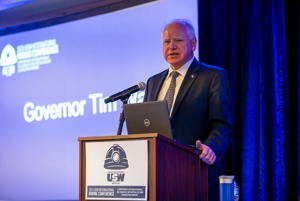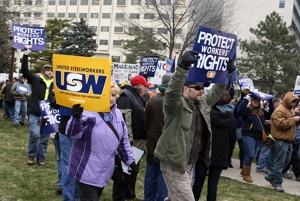Making the Colombia Labor Action Plan Work for Workers
The LAP made big promises. It promised protections to address the violence that targets union leaders; it promised legal reforms to ensure workers could become direct employees instead of subcontractors; it promised a new ministry of labor that would proactively protect labor rights; and it promised criminal prosecutions of companies that illegally repress workers’ right to join a union of their choosing. While the AFL-CIO appreciated the efforts of Presidents Obama and Santos to improve the situation for Colombia’s working families by implementing the Labor Action Plan, we said at the time the Labor Action Plan did not go far enough to ensure the safety and security of Colombian workers. We said that before our governments declared victory on the Labor Action Plan and moved ahead with the FTA, we needed to see real change. We demanded measurable proof that workers would be better off, that union leaders would be safe, and that unions were growing larger and stronger as a result of the action plan. In a word, we were skeptical.
And we were right. On April 7, 2014, Colombia’s National Union School (ENS in Spanish) and the Colombian labor movement released a report that details the many ways the Labor Action Plan has not delivered on its promises—violence against trade unionists continues; in the three years since the Labor Action Plan was signed, 73 more trade unionists were murdered in Colombia. That alone is reason enough to say the Labor Action Plan has failed. The ENS report shows the number of decent jobs has not increased in Colombia, and that the majority of the workers who were promised direct contracts and permanent employment still are trapped in informal hiring arrangements, no closer to being able to join a union or improve their jobs than they were three years ago. In spite of numerous new labor laws and decrees, and hundreds of new labor inspectors, not a single company fined by the Ministry of Labor for violating the law and workers’ rights has paid up, and companies still are violating worker rights in Colombia with impunity.
Today we must take stock of these promises made three years ago. The AFL-CIO joins the Colombian labor movement and the ENS by releasing this report on the LAP . We include the words of workers who are struggling to defend their rights and to make the Labor Action Plan deliver on its promises.
I hope that both reports will serve as a wake-up call to Presidents Obama and Santos, and to the government officials responsible for protecting worker rights. They need to know their work is far from finished. They must do more to ensure Colombian workers can organize to improve their lives in a climate of respect for their fundamental rights. The AFL-CIO will continue to stand with the working people of Colombia and fight for their right to improve working conditions and standards of living, rebuild their unions, and demand that our governments deliver what was promised in the LAP. I promise we won’t rest until they do.
***
This has been reposted from the AFL-CIO.
***
Photo by OECD.
By clicking Sign Up you're confirming that you agree with our Terms and Conditions.
Related Blogs
Ready to make a difference?
Are you and your coworkers ready to negotiate together for bigger paychecks, stronger benefits and better lives?

